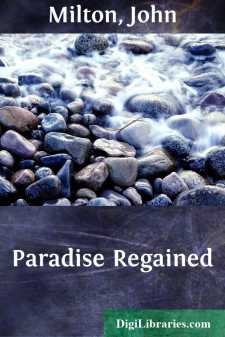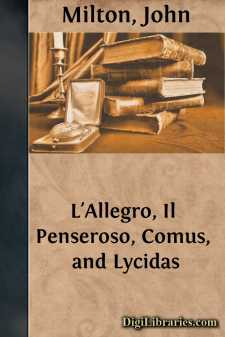Categories
- Antiques & Collectibles 13
- Architecture 36
- Art 48
- Bibles 22
- Biography & Autobiography 813
- Body, Mind & Spirit 139
- Business & Economics 28
- Children's Books 12
- Children's Fiction 9
- Computers 4
- Cooking 94
- Crafts & Hobbies 4
- Drama 346
- Education 46
- Family & Relationships 57
- Fiction 11825
- Games 19
- Gardening 17
- Health & Fitness 34
- History 1377
- House & Home 1
- Humor 147
- Juvenile Fiction 1873
- Juvenile Nonfiction 202
- Language Arts & Disciplines 88
- Law 16
- Literary Collections 686
- Literary Criticism 179
- Mathematics 13
- Medical 41
- Music 40
- Nature 179
- Non-Classifiable 1768
- Performing Arts 7
- Periodicals 1453
- Philosophy 64
- Photography 2
- Poetry 896
- Political Science 203
- Psychology 42
- Reference 154
- Religion 511
- Science 126
- Self-Help 83
- Social Science 81
- Sports & Recreation 34
- Study Aids 3
- Technology & Engineering 59
- Transportation 23
- Travel 463
- True Crime 29
John Milton
John Milton (1608–1674) was an English poet, polemicist, and civil servant, best known for his epic poem "Paradise Lost," which explores the biblical story of the Fall of Man. His work is celebrated for its complex themes, rich language, and profound exploration of theology, politics, and human nature. Milton also wrote "Paradise Regained" and "Samson Agonistes," further demonstrating his mastery in blending classical forms with Christian content. Blind in his later years, Milton continued to write, dictating his works to aides, and remains one of the most influential poets in English literature.
Author's Books:
Sort by:
by:
John Milton
THE FIRST BOOK I, WHO erewhile the happy Garden sung By one man's disobedience lost, now sing Recovered Paradise to all mankind, By one man's firm obedience fully tried Through all temptation, and the Tempter foiled In all his wiles, defeated and repulsed, And Eden raised in the waste Wilderness. Thou Spirit, who led'st this glorious Eremite Into the...
more...
by:
John Milton
PREFACE. The purpose held in view by those who place the study of Milton in high school English courses is twofold: first, that youth may seasonably become acquainted with a portion of our great classic poetry; and, secondly, that they may in this poetry encounter and learn to conquer difficulties more serious than those they have met in the literature they have hitherto read. It is for the teacher to...
more...
by:
John Milton
L'ALLEGRO HENCE, loathed Melancholy, …………Of Cerberus and blackest Midnight born In Stygian cave forlorn …………'Mongst horrid shapes, and shrieks, and sights unholy! Find out some uncouth cell, …………Where brooding Darkness spreads his jealous wings, And the night-raven sings; …………There, under ebon shades and low-browed rocks, As...
more...
by:
John Milton
They, who to states and governors of the Commonwealth direct their speech, High Court of Parliament, or, wanting such access in a private condition, write that which they foresee may advance the public good; I suppose them, as at the beginning of no mean endeavour, not a little altered and moved inwardly in their minds: some with doubt of what will be the success, others with fear of what will be the...
more...





